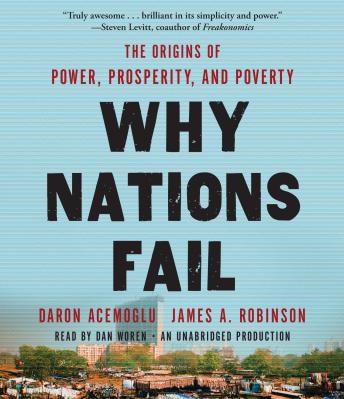“Why Nations Fail” by Daron Acemoglu and James A. Robinson explores the political and economic reasons behind the success or failure of nations. The audiobook delves into how institutions shape the destiny of countries.
“Why Nations Fail” offers a compelling analysis of global inequality. The authors argue that inclusive political and economic institutions foster prosperity, while extractive institutions lead to poverty. Acemoglu and Robinson use historical examples to demonstrate their theories. They examine various nations and explain how specific choices led to success or failure.
The audiobook covers diverse topics, from colonialism to modern economic policies. It aims to provide listeners with a deep understanding of how institutions influence national outcomes. This insightful book is essential for anyone interested in economics, politics, or history.
Core Themes In ‘why Nations Fail’
The audiobook ‘Why Nations Fail’ by Daron Acemoglu and James A. Robinson explores why some nations prosper and others do not. It dives deep into the core themes that determine the success or failure of nations. Let’s explore the key aspects of this influential work.
Institutions And Economic Success
Strong institutions play a vital role in a nation’s success. These include effective laws, fair courts, and reliable police forces. Such institutions ensure safety and fairness. They create an environment where businesses can thrive.
- Property rights must be protected.
- Contracts should be enforceable.
- Corruption needs to be minimized.
Countries with weak institutions often face poverty and instability. Weak institutions fail to protect people and their assets. This leads to lack of trust and reduced investments.
The Role Of Political Power
Political power shapes the fate of nations. Inclusive political systems distribute power widely. This allows many voices to be heard.
- People can vote and influence decisions.
- Leaders are held accountable.
- Policies benefit the majority.
On the other hand, extractive political systems concentrate power in the hands of a few. This often leads to oppression and exploitation. The majority suffer while the elite prosper.
Understanding these themes helps in grasping why some nations succeed and others fail. The audiobook provides deep insights into these crucial elements.

Credit: www.audiobooks.com
Impact Of Historical Events
The audiobook ‘Why Nations Fail’ by Daron Acemoglu and James A. Robinson explores why some nations succeed while others fail. The authors argue that the impact of historical events shapes a nation’s path. These events create lasting institutions and systems.
Case Studies From The Book
Acemoglu and Robinson provide many case studies. These show how historical events influence nations. For example:
- The Glorious Revolution in England led to more inclusive institutions.
- The Spanish conquest of Latin America created extractive institutions.
These case studies highlight the importance of inclusive versus extractive institutions.
Lessons For Modern Policy
Understanding history helps modern policymakers. They can learn valuable lessons from the past:
- Inclusive institutions promote economic growth.
- Extractive institutions hinder development.
Creating the right policies today can ensure better futures. Policymakers should focus on inclusivity and fairness.
The Audiobook Experience
The audiobook of Why Nations Fail offers a unique experience. It transforms complex topics into an engaging narrative. This version brings the theories of Daron Acemoglu and James A. Robinson to life.
Narration And Its Effect
The narration makes the audiobook special. A skilled narrator can change the impact of the content. The narrator’s voice adds emotion and clarity. This helps listeners understand better. The narrator uses tone to stress key points. This makes the material more memorable. The pace of the narration also helps in grasping complex ideas.
Accessibility And Understanding
The audiobook format offers great accessibility. It allows people to learn on the go. You can listen while commuting or exercising. This makes it easy to fit learning into a busy schedule. The audiobook breaks down complex ideas. This makes them easier to understand. Listeners can pause and replay sections. This helps in better retention of information.
| Feature | Benefit |
|---|---|
| Skilled Narration | Enhances understanding and retention |
| Mobile Learning | Accessible anytime, anywhere |
| Replay Option | Helps reinforce learning |
- Engaging – Narration brings the book to life.
- Convenient – Listen during daily activities.
- Effective – Complex ideas made simple.

Credit: www.listening-books.org.uk

Credit: www.penguinrandomhouse.com
Conclusion
The “Why Nations Fail” audiobook offers deep insights into the reasons behind the success and failure of nations. Daron Acemoglu and James A. Robinson present compelling evidence. Their analysis helps listeners understand the critical role of institutions. This audiobook is essential for anyone interested in economics, politics, or history.



